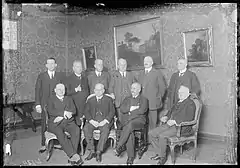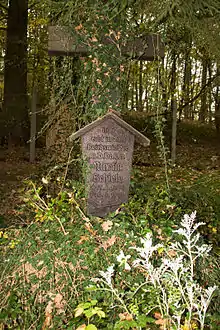Martin Schiele
Martin Schiele (17 January 1870 – 16 February 1939) was a German nationalist politician. Schiele was part of the leadership of the German National People's Party (DNVP) from its 1918 founding until Alfred Hugenberg became leader in 1928. He was also the chief representative of the agrarian wing of the DNVP.[1] As a member of Hans Luther's coalition government Schiele secured the restoration of agricultural and industrial protectionism with the tariff of 1925.[2] As Minister of Food in 1927–28, Schiele favoured state credit as a means for subsidising agriculture.[3]


He was persuaded by President Hindenburg to return as Minister of Food in Heinrich Brüning's cabinet.[4] The Agricultural League under Schiele's leadership was criticised by Richard Walther Darré's Nazi Agrarian Apparatus. Schiele ceased to be leader of the Agricultural League shortly after the 1930 election.[5] Unhappy with Hugenberg's leadership, Schiele left the DNVP and moved closer to the Conservative People's Party.[6]
Notes
- Dieter Gessner, 'Agrarian Protectionism in the Weimar Republic', Journal of Contemporary History, Vol. 12, No. 4 (Oct., 1977), p. 765.
- Gessner, p. 765.
- Gessner, p. 766.
- Larry Eugene Jones, 'German Conservatism at the Crossroads: Count Kuno von Westarp and the Struggle for Control of the DNVP, 1928-30', Contemporary European History, Vol. 18, No. 2 (May, 2009), p. 166.
- Gessner, p. 771.
- Jones, p. 174.
External links
| Government offices | ||
|---|---|---|
| Preceded by Karl Jarres |
Interior Minister of Germany 1925 |
Succeeded by Otto Gessler |
| Preceded by Heinrich Haslinde |
Minister for Food 1927–1928 |
Succeeded by Hermann Dietrich |
| Preceded by Hermann Dietrich |
Minister for Food 1930–1932 |
Succeeded by Magnus Freiherr von Braun |
.svg.png.webp)